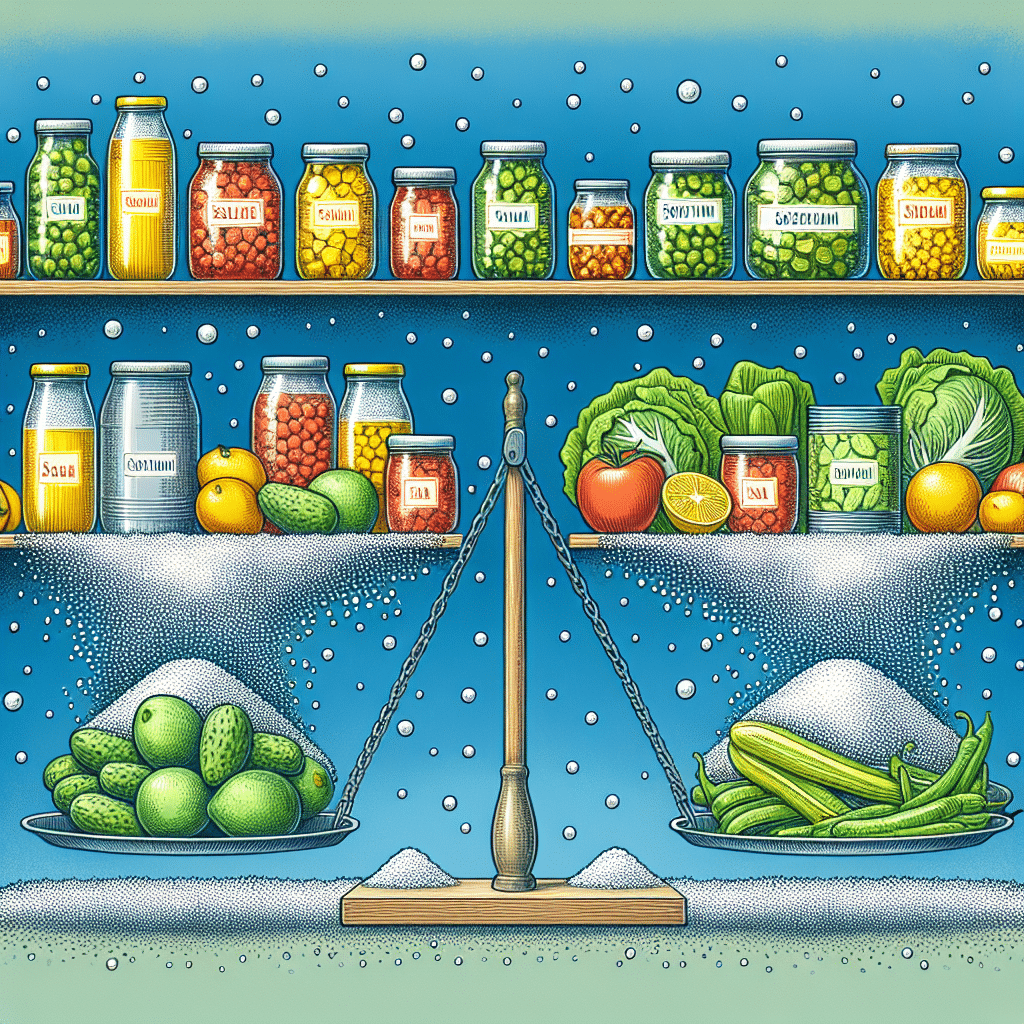Impact of Sodium-based Food Preservatives
-
Table of Contents
- Exploring the Impact of Sodium-Based Food Preservatives on Health and Safety
- Understanding Sodium-Based Preservatives
- Health Implications of Sodium-Based Preservatives
- Potential Carcinogenic Effects
- Impact on Heart Health
- Respiratory and Allergic Reactions
- Behavioral Effects
- Regulatory Measures and Consumer Awareness
- Alternatives to Sodium-Based Preservatives
- Conclusion: Balancing Safety with Health Concerns
- Discover Healthier Alternatives with ETprotein’s Protein Products
Exploring the Impact of Sodium-Based Food Preservatives on Health and Safety

Food preservation is an age-old practice that has evolved significantly over time. Among the various methods and substances used, sodium-based preservatives have become a staple in the food industry. These compounds are used to extend shelf life, prevent spoilage from bacteria, and maintain food quality. However, their widespread use has raised concerns about their impact on health and safety. This article delves into the effects of sodium-based food preservatives, supported by statistics and research findings.
Understanding Sodium-Based Preservatives
Sodium-based preservatives are chemicals that often contain sodium compounds capable of inhibiting the growth of bacteria, yeasts, and molds. Some common sodium-based preservatives include:
- Sodium benzoate
- Sodium nitrite
- Sodium nitrate
- Sodium propionate
- Sodium sulfite
These preservatives are found in a variety of foods, including processed meats, canned goods, sauces, and baked products. Their effectiveness in preventing foodborne illnesses is well-documented, but their potential health implications cannot be overlooked.
Health Implications of Sodium-Based Preservatives
The impact of sodium-based preservatives on health has been a topic of debate among scientists and health professionals. Here are some of the key concerns:
Potential Carcinogenic Effects
Some studies have suggested a link between certain sodium-based preservatives and cancer. For instance, sodium nitrite and sodium nitrate, commonly used in cured meats, can form nitrosamines when exposed to high heat, which are known carcinogens. The International Agency for Research on Cancer (IARC) classifies processed meats as Group 1 carcinogens, partly due to these compounds.
Impact on Heart Health
High sodium intake is associated with increased blood pressure and a higher risk of heart disease. While sodium-based preservatives contribute to the overall sodium content in the diet, it’s the total sodium consumption that matters most for heart health. The American Heart Association recommends no more than 2,300 milligrams a day, moving toward an ideal limit of 1,500 mg per day for most adults.
Respiratory and Allergic Reactions
Some individuals may experience asthma attacks or allergic reactions to certain sodium-based preservatives like sulfites. The FDA estimates that one out of 100 people is sensitive to sulfites, with the prevalence being higher among those with asthma.
Behavioral Effects
There is ongoing research into the relationship between food preservatives and behavioral changes, particularly in children. Sodium benzoate, for example, has been studied for its potential role in exacerbating hyperactive behavior in children with attention deficit hyperactivity disorder (ADHD).
Regulatory Measures and Consumer Awareness
Regulatory agencies such as the FDA and the European Food Safety Authority (EFSA) have established guidelines for the safe use of sodium-based preservatives. These organizations continuously review scientific evidence to ensure that the use of these compounds does not pose significant health risks to consumers.
Consumer awareness has also led to a demand for products with fewer artificial preservatives. This has prompted the food industry to explore natural alternatives and reformulate products to reduce the use of sodium-based preservatives.
Alternatives to Sodium-Based Preservatives
As consumers become more health-conscious, the food industry is responding by seeking out alternative preservation methods. Some of these include:
- Natural preservatives like rosemary extract, vinegar, and citric acid
- High-pressure processing (HPP)
- Modified atmosphere packaging (MAP)
- Antimicrobial peptides
These alternatives can help reduce the reliance on sodium-based preservatives while still ensuring food safety and extending shelf life.
Conclusion: Balancing Safety with Health Concerns
The use of sodium-based food preservatives is a complex issue that balances the need for food safety with potential health concerns. While these preservatives play a crucial role in preventing foodborne illnesses, it is important for consumers to be mindful of their overall sodium intake. Regulatory agencies continue to monitor the safety of these compounds, and the food industry is exploring healthier alternatives to meet consumer demand.
For those looking to reduce their intake of sodium-based preservatives, opting for fresh, whole foods and checking labels for preservative content can be effective strategies. As research progresses, it is likely that we will see further innovations in food preservation that prioritize both safety and health.
Discover Healthier Alternatives with ETprotein’s Protein Products
If you’re seeking healthier food options without compromising on quality, ETprotein offers a range of organic bulk vegan proteins that are free from sodium-based preservatives. Their products, including organic rice protein, pea protein, and various seed proteins, provide a nutritious alternative for those looking to maintain a balanced diet.
ETprotein’s commitment to non-GMO, allergen-free ingredients with high purity levels makes their offerings ideal for a variety of industries, from nutraceuticals to food and beverage. By choosing ETprotein, you can enjoy the benefits of high-quality protein sources without the added concern of sodium-based preservatives.
About ETprotein:
ETprotein, a reputable protein and L-(+)-Ergothioneine (EGT) Chinese factory manufacturer and supplier, is renowned for producing, stocking, exporting, and delivering the highest quality organic bulk vegan proteins and L-(+)-Ergothioneine. They include Organic rice protein, clear rice protein, pea protein, clear pea protein, watermelon seed protein, pumpkin seed protein, sunflower seed protein, mung bean protein, peanut protein, and L-(+)-Ergothioneine EGT Pharmaceutical grade, L-(+)-Ergothioneine EGT food grade, L-(+)-Ergothioneine EGT cosmetic grade, L-(+)-Ergothioneine EGT reference grade and L-(+)-Ergothioneine EGT standard. Their offerings, characterized by a neutral taste, non-GMO, allergen-free attributes, with L-(+)-Ergothioneine purity over 98%, 99%, cater to a diverse range of industries. They serve nutraceutical, pharmaceutical, cosmeceutical, veterinary, as well as food and beverage finished product distributors, traders, and manufacturers across Europe, USA, Canada, Australia, Thailand, Japan, Korea, Brazil, and Chile, among others.
ETprotein specialization includes exporting and delivering tailor-made protein powder and finished nutritional supplements. Their extensive product range covers sectors like Food and Beverage, Sports Nutrition, Weight Management, Dietary Supplements, Health and Wellness Products, and Infant Formula, ensuring comprehensive solutions to meet all your protein needs.
As a trusted company by leading global food and beverage brands and Fortune 500 companies, ETprotein reinforces China’s reputation in the global arena. For more information or to sample their products, please contact them and email sales(at)ETprotein.com today.












